
Gdańsk is a city on the Baltic coast of northern Poland. With a population of 470,621, Gdańsk is the capital and largest city of the Pomeranian Voivodeship. It is Poland's principal seaport and the country's fourth-largest metropolitan area.

Sopot is a seaside resort city in Pomerelia on the southern coast of the Baltic Sea in northern Poland, with a population of approximately 40,000. It is located in Pomeranian Voivodeship, and has the status of the county, being the smallest city in Poland to do so. It lies between the larger cities of Gdańsk to the southeast and Gdynia to the northwest. The three cities together form the metropolitan area of Tricity.

Chojnice is a town in northern Poland with 39,423 inhabitants as of December 2021, near the Tuchola Forest. It is the capital of the Chojnice County in the Pomeranian Voivodeship.

The Free City of Danzig was a city-state under the protection of the League of Nations between 1920 and 1939, consisting of the Baltic Sea port of Danzig and nearly 200 other small localities in the surrounding areas. The polity was created on 15 November 1920 in accordance with the terms of Article 100 of the 1919 Treaty of Versailles after the end of World War I. In line with the treaty provisions, the entity was established under the oversight of the League of Nations. Although predominantly German-populated, the territory was bound by the imposed union with Poland covering foreign policy, defence, customs, railways and post, while remaining distinct from both the post-war German Republic and the newly independent Polish Republic. In addition, Poland was given certain rights pertaining to port facilities in the city.
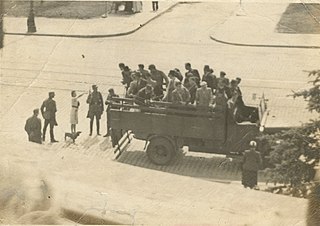
Łapanka ( )(English: "roundup" or "catching") was the Polish name for a World War II practice in German-occupied Poland, whereby the German SS, Wehrmacht and Gestapo rounded up civilians on the streets of Polish cities. The civilians arrested were in most cases chosen at random from among passers-by or inhabitants of city quarters surrounded by German forces prior to the action.
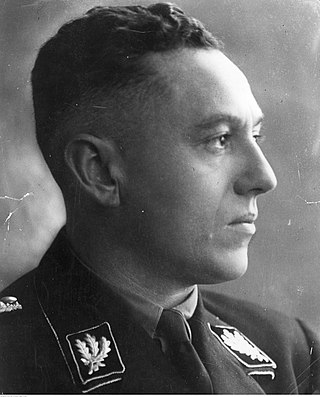
Albert Maria Forster was a Nazi German politician, member of the SS and war criminal. Under his administration as the Gauleiter and Reichsstatthalter of Danzig-West Prussia during the Second World War, the local non-German populations of Poles and Jews were classified as sub-human and subjected to extermination campaigns involving ethnic cleansing, mass murder, and in the case of some Poles with German ancestry, forceful Germanisation. Forster was directly responsible for the extermination of non-Germans and was a strong supporter of Polish genocide, which he had advocated before the war. Forster was tried, convicted and hanged in Warsaw for his crimes, after Germany was defeated.

The Defence of the Polish Post Office in Danzig (Gdańsk) was one of the first acts of World War II in Europe, as part of the September Campaign. On 1 September 1939 the Invasion of Poland was initiated by Germany when the battleship Schleswig-Holstein opened fire on the Polish-controlled harbor of Danzig, around 04:45–48 hours. Danzig paramilitaries and police, supported by Germany, immediately joined the offensive to take full control of the city, by capturing the Polish post office. Polish personnel defended the building for some 15 hours against assaults by the SS Heimwehr Danzig, local SA formations and special units of Danzig police. All but four of the defenders, who were able to escape from the building during the surrender, were sentenced to death by a German court martial as illegal combatants on 5 October 1939, and executed.
"Erika" is a German marching song. It is primarily associated with the German Army, especially that of Nazi Germany. It was published by Herms Niel in 1938, and soon came into usage by the Wehrmacht. It was frequently played during Nazi Party public events. According to British soldier, historian, and author Major General Michael Tillotson (1928–2023), it was the single most popular marching song of any country during the Second World War.

The Ciepielów massacre that took place on 8 September 1939 was one of the largest and best documented war crimes of the Wehrmacht during its invasion of Poland. On that day, the forest near Ciepielów was the site of a mass murder of Polish prisoners of war from the Polish Upper Silesian 74th Infantry Regiment. The massacre was carried out by soldiers from the German Army's 15th Motorized Infantry Regiment, 29th Motorized Infantry Division, under the command of Colonel Walter Wessel.
KS Gedania Danzig was an ethnically-Polish association football club that was part of German football competition in the inter-war period. It was formed in 1922 in what was at the time the Free City of Danzig. Banned by the Nazis in 1939, the club re-emerged following the end of World War II and is active today as Gedania 1922 Gdańsk.

Irena Wanda Jarocka, was a Polish singer.
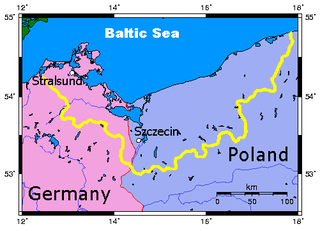
History of Pomerania between 1933 and 1945 covers the period of one decade of the long history of Pomerania, lasting from the Adolf Hitler's rise to power until the end of World War II in Europe. In 1933, the German Province of Pomerania like all of Germany came under control of the Nazi regime. During the following years, the Nazis led by Gauleiter Franz Schwede-Coburg manifested their power through the process known as Gleichschaltung and repressed their opponents. Meanwhile, the Pomeranian Voivodeship was part of the Second Polish Republic, led by Józef Piłsudski. With respect to Polish Pomerania, Nazi diplomacy – as part of their initial attempts to subordinate Poland into Anti-Comintern Pact – aimed at incorporation of the Free City of Danzig into the Third Reich and an extra-territorial transit route through Polish territory, which was rejected by the Polish government, that feared economic blackmail by Nazi Germany, and reduction to puppet status.

"Siekiera, motyka" is a famous Polish Resistance military and street-level protest song from the period of World War II. It became the most popular song of occupied Warsaw, and then, of the entire occupied Poland. The song was inspired by an old humorous folk-tune performed already in 1917 with different and constantly changing lyrics, adapted for the army in a 1938 publication under a different title.

The massacres in Piaśnica were a set of mass executions carried out by Nazi Germany during World War II, between the fall of 1939 and spring of 1940 in Piaśnica Wielka in the Darzlubska Wilderness near Wejherowo. The exact number of people murdered is unknown, but estimates range between 12,000 and 14,000 victims. Most of them were Polish intellectuals from Gdańsk Pomerania, but Poles, Jews, Czechs and German inmates from mental hospitals from the General Government and the Third Reich were also murdered. After the Stutthof concentration camp, Piaśnica was the largest site of killings of Polish civilians in Pomerania by the Germans, and for this reason, is sometimes referred to as the "second" or "Pomeranian" Katyn. It was the first large-scale Nazi atrocity in occupied Poland.
The Jewish Community of Gdańsk dates back to at least the 15th century though for many centuries it was separated from the rest of the city. Under Polish rule, Jews acquired limited rights in the city in the 16th and 17th centuries and after the city's 1793 incorporation into Prussia the community largely assimilated to German culture. In the 1920s, during the period of the Free City of Danzig, the number of Jews increased significantly and the city acted as a transit point for Jews leaving Eastern Europe for the United States and Canada. Antisemitism existed among German nationalists and the persecution of Jews in the Free City intensified after the Nazis came to power in 1933. During World War II and the Holocaust the majority of the community either emigrated or were murdered. Since the fall of communism Jewish property has been returned to the community, and an annual festival, the Baltic Days of Jewish Culture, has taken place since 1999.
Józef Tusk was the grandfather of the former Prime Minister of Poland, Donald Tusk. During World War II, he served in the Wehrmacht, which proved to be controversial during the 2005 Polish presidential election. He worked as a luthier.
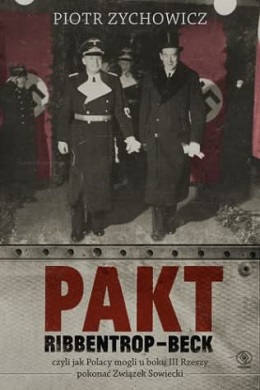
Pact Ribbentrop - Beck is an alternative history novel by the Polish journalist and writer Piotr Zychowicz. The book, whose full title is Pact Ribbentrop - Beck, or How Poles Could Have Defeated the Soviet Union alongside the Third Reich, was published in 2012 by Dom Wydawniczy Rebis from Poznań.
Film Polski was the state-run film production and distribution organization of Poland, founded in 1945.
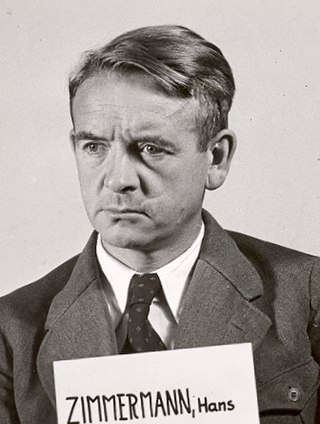
Hans Zimmermann was a German Nazi Party official. He served as the Acting Gauleiter of Gau Franconia between February 1940 and April 1942.

Wolfram Wette is a German military historian and peace researcher. He is an author or editor of over 40 books on the history of Nazi Germany, including the seminal Germany and the Second World War series from the German Military History Research Office (MGFA).















